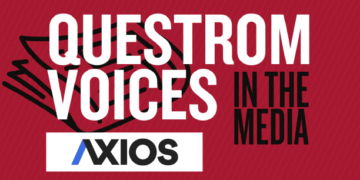The tax policies proposed by President-elect Joe Biden has implications for your paycheck, investments, and retirement savings.
Insights@Questrom spoke to Pete Lisowsky, tax expert and associate professor of accounting at Questrom, about what’s ahead for President-elect Biden’s tax plan.
WHAT ARE THE HIGHLIGHTS OF PRESIDENT-ELECT BIDEN’S TAX PLAN, ESPECIALLY AS IT PERTAINS TO INDIVIDUALS?
Lisowsky: President-elect Biden’s tax plan outlines several major changes to the current U.S. tax code pertaining to individuals. The highlights of his plan propose to:
- Increase the top individual marginal tax rate to 39.6% for households with annual incomes over $400,000. The current top rate for individuals is 37%. The higher rate was in effect during the Clinton and Obama years.
- Apply the 12.4% Social Security payroll tax to income above $400,000. Half of this tax is paid by employers and half by employees, so the added tax would effectively be 6.2% to high-income individuals. Currently, the Social Security tax only applies to wages up to $137,700 in 2020 ($142,800 in 2021), above which there is actually no Social Security tax applied. To minimize the tax burden for intermediate earners, the Biden proposal creates what is known as a “donut hole” where income above the current cap but below $400,000 will still not be subject to the Social Security tax.
- Increase the tax rate on long-term capital gains and qualified dividends from 20% to 39.6% for households with incomes above $1 million. Technically, after one considers the 3.8% Obamacare taxes already applied on unearned income like capital gains and dividends, the top effective rate increases from 23.8% to 43.4%.
- Exempt only the first $3.5 M of assets from the federal estate tax. Current law allows the first $11.58 M to escape the federal estate tax. Furthermore, the Biden plan will increase the tax rate on the amount above the exemption to 45% from the current 40%.
- Tax all the unrealized gains (i.e., appreciation in assets) of a deceased individual. Currently, the tax law does not tax unrealized gains upon a decedent’s death, and thus provides an heir a “step up” in basis upon inheritance of the appreciated property. This means that under the Biden plan, a stock portfolio that has grown over the last 20-30 years will now be subject to income tax upon the individual’s death, whereas it is currently not subject to tax.
- Increase the child tax credit from $2,000 to $3,000 per qualifying child age 17 and under, as well as add a “bonus” tax credit of $600 per child under the age of 6.
It is worth mentioning that on the corporate side, the Biden plan also seeks to:
- Increase the corporate tax rate from 21% to 28%.
- Tax the book (i.e., financial reporting) profits of corporations. This is a way to ensure that at least some tax is paid by the largest corporations who frequently report healthy profits to shareholders but anemic taxable income (or tax losses) to the IRS.
- Increase the tax on foreign-sourced income earned by U.S. multinationals.
WHAT EFFECT WOULD HIS TAX PLAN HAVE ON THE U.S. BUDGET DEFICIT AND CURRENT DEBT?
Lisowsky: The Tax Foundation estimates that the Biden tax proposals altogether will raise over $3.3 trillion in additional revenue over the next 10 years, relative to current law. The Tax Policy Center has put that estimate closer to $4 trillion. The biggest items to raise federal revenue are (1) increasing the corporate income tax, at over $1 trillion; (2) applying the Social Security tax to incomes above $400,000, at almost $820 billion; and (3) increasing taxes on capital gains and dividends, at $469 billion. Although the numbers look big, these ten-year estimates reflect only a small share of the U.S.’s current $20 trillion debt. To put these numbers in perspective, the Congressional Budget Office estimates that the one-year budget deficit in 2020 alone is $3.1 trillion, more than triple the shortfall in 2019. Therefore, raising an additional $3.3 trillion over the next ten years will effectively only erase the deficit of 2020 alone.
Another notable feature of the Biden plan is its progressivity. That is, it places most of the tax burden on the highest-income taxpayers and largely spares lower- and middle-income taxpayers from a tax increase. It is expected that the after-tax income of the Top 1% of earners will decrease by more than 11%; and the after-tax income of the Top 20% will decrease by almost 4%. However, the after-tax income of the bottom 10% is expected to rise by almost 11%.
WHAT EFFECT WILL THE TAX PLAN HAVE ON U.S. ECONOMIC GROWTH?
Lisowsky: The Biden tax plans are generally expected to slow U.S. economic growth over the next 10 years. GDP is expected to be reduced by 1.6%, mostly due to the rise in the corporate income tax. Wages are expected to drop by 1.15%, and 542,000 jobs are expected to be lost.
WHAT ASPECTS OF THE TAX PLAN MIGHT NOT PASS IF THE SENATE IS CONTROLLED BY THE REPUBLICAN PARTY?
Lisowsky: To be frank, it’s hard to see any tax increase being passed if the Senate is controlled by Republicans. They fought – and won – a particularly bruising and partisan fight in 2017 to pass the Tax Cuts and Jobs Act, which governs the current lower tax rates. Even at the time of its passage, the TCJA was already expected to add about $1.5 trillion to the U.S. debt over the following 10 years, despite strong GDP and record-low unemployment. Recall that the last time a Republican increased taxes, as George H.W. Bush did in 1990 with the assistance of a Democratically controlled Congress, re-election was lost; recall his infamous phrase in 1988, “Read my lips: no new taxes!” that came back to haunt him and other Republicans.
In fact, given the huge economic hit of the COVID-19 pandemic, it is possible that any tax increase, even if passed by a Democratically controlled Congress, won’t take effect until 2022. More realistically if the Senate is controlled by Republicans, a Biden tax increase may have to wait until after the 2022 mid-term elections, assuming Democrats can take the Senate majority.
However, there is a looming tax increase already baked into current law. Under the TCJA, the current lower tax rates for individuals are set to expire and revert back to the higher rates at the start of 2026. So the question becomes whether a tax increase will come sooner or later, and likely sooner if Democrats do take Senate control.























